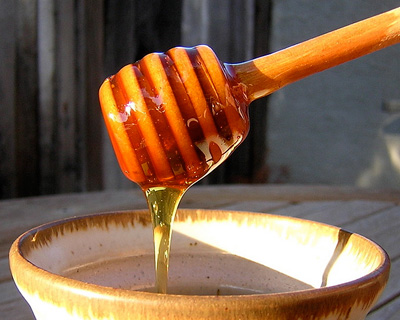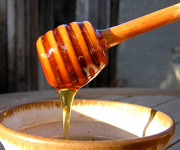 Mo’ honey, mo’ problems.Photo: Kathryn HarperIf it’s possible to write a blockbuster story about honey, Food Safety News has done it:
Mo’ honey, mo’ problems.Photo: Kathryn HarperIf it’s possible to write a blockbuster story about honey, Food Safety News has done it:
A third or more of all the honey consumed in the U.S. is likely to have been smuggled in from China and may be tainted with illegal antibiotics and heavy metals. A Food Safety News investigation has documented that millions of pounds of honey banned as unsafe in dozens of countries are being imported and sold here in record quantities. …
Experts interviewed by Food Safety News say some of the largest and most long-established U.S. honey packers are knowingly buying mislabeled, transshipped or possibly altered honey so they can sell it cheaper than those companies who demand safety, quality and rigorously inspected honey.
This is a serious issue because China has a monumental problem with its honey industry. A bee epidemic in China several years ago led beekeepers there to use an antibiotic that the U.S. FDA has banned in food and that has been linked to DNA damage in children. And as FSN observes, though China has a state-of-the-art honey processing industry, its beekeeping has not kept up — resulting, for example, in some Chinese honey being contaminated with lead from the use of improper storage containers.
Even worse, Chinese honey brokers have been known to create counterfeit product made of “a mix of sugar water, malt sweeteners, corn or rice syrup, jaggery [a type of unrefined sugar], barley malt sweetener or other additives with a bit of actual honey.” A label is slapped on the container and the adulterated honey is shipped through another country — for the most part, India — before finally making its way to the US.
Much of this came out two years ago during a major government investigation into “honey laundering” (that’s when I first heard the term). But the resulting arrests didn’t do much to halt the illegal activities.
For all of the above reasons, honey from India is already banned in the European Union, and it’s supposed to be illegal to import food into the U.S. that’s been banned in other countries. However, the FDA response has been muted. A representative told FSN that the agency “would not know about honey that has been banned from other countries,” but experts and other federal agencies believe that’s because the FDA refuses to look. Indeed, the FDA appears to have adopted the policy the Pentagon just dropped: Don’t ask, don’t tell.
And it’s not just outside experts who are alarmed at FDA’s lackadaisical approach to honey laundering. FDA is supposed to be working with U.S. Customs officials to crack down on this practice. Yet, according to FSN, Customs investigators claim that:
… the cooperation is more on paper than in practice and that the FDA continues to be the weak link. They say the FDA either doesn’t have the resources to properly do the job or is unwilling to commit them.
ICE and the border patrol can and do go after the honey launderers by enforcing the anti-dumping and tariff violation laws. But protecting consumers from dangerous honey, identifying it as adulterated and therefore illegal for importation, falls to the FDA. And many of its enforcement colleagues say the food safety agency doesn’t see this as a priority.
There’s much more to the story, so I highly recommend reading FSN’s deep dive in full.
But this article raises major questions for me about the role of U.S. honey packers and distributors. Why don’t they care more? Domestic honey production only meets about half of U.S. consumer demand, so it’s clear they feel the pressure to find honey somewhere. But at a certain point, you have a moral obligation to the consumer that should trump the profit motive.
“Everyone in the industry knows” about the illegal smuggling, says one industry insider. He claims that four or five of the 12 major U.S. honey packers are responsible for most of the illegal purchases. It’s no surprise, then, that executives from those companies refused to comment on the story. Clearly, they are unable to ensure the quality and purity of the product they are selling. What else is there to say?
What’s most concerning is that consumers are limited in their ability to avoid tainted honey, since 65 percent of honey sold in the U.S. goes into processed food. So certainly, you should buy local honey from small producers you trust. And if you can’t find good honey, don’t buy what’s on supermarket shelves. But we’re also at the mercy of food processors’ willingness to ensure the ingredients they put into their products are pure.
The U.S. government could act aggressively to stop honey laundering, as the E.U. already has. But that kind of action could throw the U.S. food processing industry into turmoil. No matter the risks, the feds don’t generally consider that an option. So, unless the FDA displays a sudden willingness to trade wrist slaps for perp walks when it comes to food company executives, honey laundering appears here to stay. The FDA did not respond to our requests for further comment.
When I wrote about this two years ago, I said, “This story is really about a food system that’s diffuse, international, and impossible to regulate — in other words, broken.” It’s still all too true.




